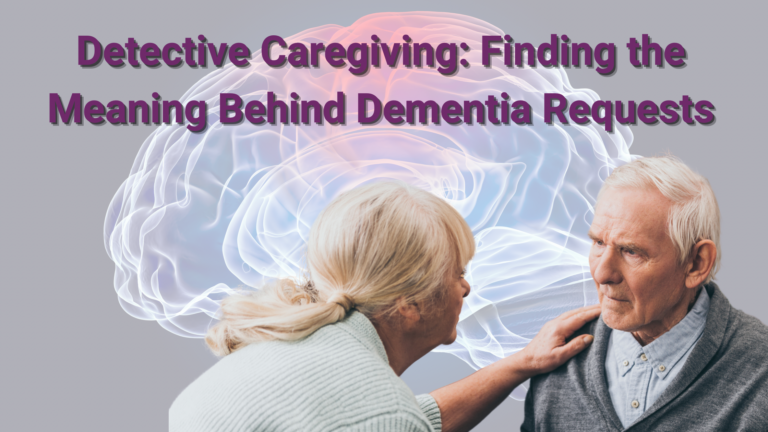Communicating with a loved one who has dementia can sometimes feel like navigating unfamiliar terrain. One moment, everything seems calm, and the next, they might be asking to go home or insisting they drive the car—things that are either impossible or unsafe. But here’s the key: beneath each question or request is usually a deeper need or emotion they’re struggling to express. And that’s where we come in, not just as caregivers, but as detectives of sorts.
When our loved ones seem confused, agitated, or stuck on a certain idea, it’s rarely about what they’re saying on the surface. Maybe they’re asking to drive the car, but what they really crave is a sense of independence. Or perhaps they’re saying they want to go home because they’re feeling lost and disconnected in the moment. Our job is to gently explore what they’re truly feeling and find ways to redirect their attention while offering comfort and reassurance.
Being a detective means paying attention to more than just their words. You look for clues in their body language, their routine, or even their surroundings to figure out what’s bothering them. Then, you redirect and reassure—gently shifting their focus to something soothing or familiar, without dismissing their feelings. And finally, by asking gentle questions, you can explore what’s really going on, showing them that they’re heard and understood, even if their reality doesn’t match yours.
In these moments, it’s less about providing the “right” answer and more about being present, compassionate, and adaptable. When we act as detectives, offering alternatives and asking questions, we open up space for connection, comfort, and calm. It’s an approach that honors their experience while keeping them safe.
I thought it would make sense to walk through a few scenarios together.
1 – When They Say “I Want to Go Home” or Want to Go on a Trip
What to Say:
- “Home is such a special place. What are your favorite parts about it?”
- “We can go soon, but let’s make this spot cozy for now. How does that sound?”
- “How about we take a little walk and chat about your favorite places?”
Why This Helps:
When someone with dementia says, “I want to go home,” it’s often more about them wanting to feel safety and comfort rather than the physical place itself. Home represents something familiar, a safe place where everything is known and secure. As you offer gentle reassurances and redirection, it’s just as important to put on your detective hat to uncover the root of their stress or disconnection.
When they express the desire to go home, try to dig deeper in a compassionate way. Maybe they’re feeling lost, anxious, or simply out of sorts. Are they in a new environment? Have their routines changed? Or could it be something as simple as feeling cold or hungry? By understanding the emotions driving their request, you can address their needs more effectively.
What to Say and Do As You Play Detective:
- Ask Gentle Questions: “What do you miss about home?” or “Is there something here that doesn’t feel quite right?”
- Observe and Actively Listen: What is going on with their body language and voice. Look for clues that could be making them feel uneasy.
- Reassure and Redirect: Once you’ve got a better idea of what’s bothering them, you can offer comfort. Maybe they’re cold, so you bring them a cozy blanket. If they’re lonely, spend a little extra time talking or holding their hand. Then gently steer the conversation or activity in a new direction.
As an example, if your loved one keeps saying they want to go home, but you notice they’re also shivering a bit. You might say, “I bet home feels warm and safe. How about we put on this blanket and sit together for a while? We can talk about your favorite memories.”
2 – When They Ask to Drive
What to Say
- “I know driving has always been important to you. How about I drive us today, and you pick where we go?”
- “The car’s in for a little maintenance, but we can still get out. How about we go for a walk together?”
- “You’re ready for an adventure! How about I be your driver today?”
Why This Helps:
Driving usually represents more than getting to a particular place, for someone with dementia it can represent independence. When someone with dementia begins asking to drive, even if they haven’t driven safely in years, it’s usually because they want to feel in control.
Here’s where you become a detective. What’s really driving their desire to hit the road? Is it about needing control, or are they just bored and restless? Understanding this can help you respond in a way that meets their true needs.
What to Ask:
- “Where are you thinking of going?”
- “Is there something you need to do?”
You are hoping to reveal if they’re feeling anxious about something or if possibly need a change of scenery. Once you know, you can address the real issue and find a safer solution.
Once you’ve figured out what’s behind their need to drive, it’s time to gently redirect. If they miss being in charge, offer them a choice in where to go. If they’re feeling antsy, suggest a different activity that gives them that sense of independence. Make sure it is an activity you can do “with’ them not “for” them.
Example:
If they’re set on driving to the store, you might say, “The store is a great idea! How about I drive, and you help me pick out what we need?”
3 – When They Ask for a Deceased Relative
What to Say:
- “They can’t be here right now, but I’m right here with you.”
- “Can we look through some old photos? I would love to hear more about your family and experiences.”
Why This Helps:
It’s tough to hear them ask for their spouse, their mother or another loved one that is deceased. But instead of correcting them, share their feelings or you begin to reminisce about good times with that deceased person, can bring them comfort. It’s a gentle way to acknowledge their emotions without causing pain.
4 – When They Resist Daily Activities (Eating, Grooming, Bathing, etc.)
What to Say:
- Eating: “Let’s try a bite together. This looks delicious!”
- Grooming: “Let’s freshen up a bit. It’ll feel so nice to be clean.”
- Toileting: “A quick bathroom break might be a good idea. I’m here to help.”
- Bathing: “How about a warm bath? It’ll be quick, and you’ll feel great after.”
Why This Helps:
Daily activities often overwhelm someone with dementia. By making the task sound simple and pleasant, you’re more likely to get some cooperation. Try to make them feel supported rather than coerced. Focus on the benefits of the task helps them see it as something positive. For example, if bathing is the issue try shower scent tablets or a diffuser to make the bathroom smell like their favorite scent and put some towels in the dryer to warm up so they can feel all warm and cozy when they finish bathing.

From a young age, Stacey’s link to the senior care industry grew alongside her mother’s work at a nursing home, where she often accompanied her. By her early teens, she secured her first official job at a nursing home, laying the foundation for a profound journey in senior care spanning over four decades. Her roles varied from opening assisted living and memory care residences to working in nursing homes and independent senior living communities. As the former Director of Fun for 300 independent seniors, she expertly organized daily events and trips. Stacey’s unwavering passion, nurtured by her family, and professional dedication as a recreation therapist, reflect her deep commitment to preserving the dignity and well-being of seniors.
Stacey’s senior care expertise has been recognized by the media including U.S. News and World Report and Care.com.
Stacey and her husband Bryan are the owners of the senior in-home care agency A Place At Home – North Austin.




